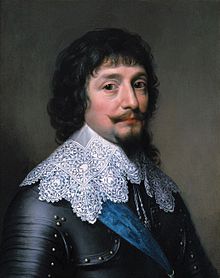
Back فريدريك الخامس (ناخب بالاتينات) Arabic فريدريش الخامس ناخب بالاتينات ARZ V Frederik Azerbaijani Фрыдрых V Вітэльсбах Byelorussian Фридрих V (Пфалц) Bulgarian Frederic V del Palatinat Catalan Fridrich Falcký Czech Frederik 5. af Pfalz Danish Friedrich V. (Pfalz) German Φρειδερίκος Ε΄ του Παλατινάτου Greek
| Frederick V | |
|---|---|
 Portrait by Michiel Jansz. van Mierevelt, c. 1630 | |
| Elector Palatine | |
| Reign | 19 September 1610 – 23 February 1623 |
| Predecessor | Frederick IV |
| Successor | Maximilian I |
| King of Bohemia (as Frederick I) | |
| Reign | 26 August 1619 – 8 November 1620 |
| Coronation | 4 November 1619 St Vitus Cathedral |
| Predecessor | Ferdinand II |
| Successor | Ferdinand II |
| Born | 26 August 1596 Deinschwang, Palatinate, Holy Roman Empire |
| Died | 29 November 1632 (aged 36) Mainz, Holy Roman Empire |
| Spouse | |
| Issue more... | See
|
| House | Palatine Simmern |
| Father | Frederick IV |
| Mother | Princess Louise Juliana of Orange-Nassau |
| Religion | Calvinist |
| Signature | |

Frederick V (German: Friedrich V.; 26 August 1596 – 29 November 1632)[1][2] was the Elector Palatine of the Rhine in the Holy Roman Empire from 1610 to 1623, and reigned as King of Bohemia from 1619 to 1620. He was forced to abdicate both roles, and the brevity of his reign in Bohemia earned him the derisive sobriquet "the Winter King" (Czech: Zimní král; German: Winterkönig).
Frederick was born at the hunting lodge (German: Jagdschloss) in Deinschwang, Palatinate (present-day Lauterhofen, Germany). He was the son of Frederick IV and of Louise Juliana of Orange-Nassau, the daughter of William the Silent and Charlotte de Bourbon-Montpensier. An intellectual, a mystic, and a Calvinist, he succeeded his father as Prince-Elector of the Rhenish Palatinate in 1610, and at the age of 17 was married to the Protestant princess Elizabeth Stuart.
In 1618 the largely Protestant Czech nobility of Bohemia rebelled against their Catholic king, Ferdinand II, beginning a conflict that would become the Thirty Years' War. Frederick was asked to assume the crown of Bohemia. He accepted the offer and was crowned on 4 November 1619,[1] as Frederick I. The estates chose Frederick because he was the leader of the Protestant Union, a military alliance founded by his father, and hoped for the support of Frederick's father-in-law, James VI of Scotland and I of England. However, James opposed his son-in-law's takeover of Bohemia from the Habsburgs and Frederick's allies in the Protestant Union failed to support him militarily by signing the Treaty of Ulm. His brief reign as king of Bohemia ended with his defeat at the Battle of White Mountain on 8 November 1620 – a year and four days after his coronation.
After the battle, the Imperial forces invaded Frederick's Palatine lands, forcing him to flee to his uncle Prince Maurice, Stadtholder of the Dutch Republic in 1622. An Imperial edict formally deprived him of the Palatinate in 1623. He lived the rest of his life in exile with his wife and family, mostly at The Hague, and died in Mainz in 1632.
His eldest surviving son Charles Louis was restored to the electorate in 1648 under the Peace of Westphalia. Another son was Prince Rupert of the Rhine, one of the most colourful figures of his time. His daughter Princess Sophia was eventually named heiress presumptive to the British throne, and is the founder of the Hanoverian line of kings.
- ^ a b Parker, Geoffery. "Frederick V (elector Palatine of the Rhine)". Encyclopædia Britannica. Retrieved 16 August 2014.
- ^ Brown, Gregory. "Friedrich V." Leibnitiana. The Houston Circle for the Study of Early Modern Philosophy. Retrieved 16 August 2014.